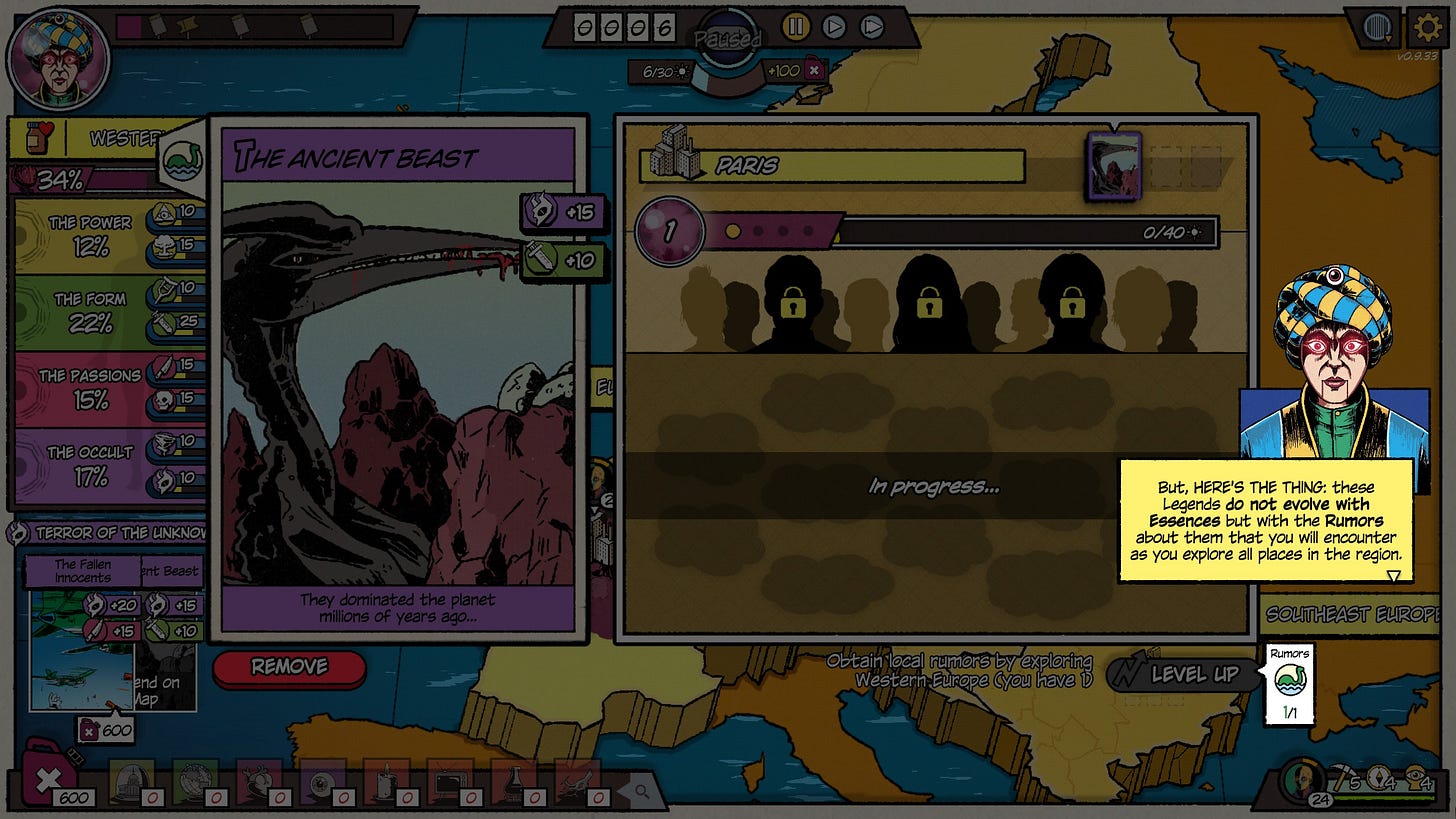The Fabulous Fear Machine — Pulp Affliction
Review
Imagine a magical “Mechanical Turk” (like that fortune-teller machine, Zoltar in Big) that has the power to put you in charge of a pharmaceutical empire, Phadro Pharm. First, you must introduce Legends, urban and wild, that will help you spread Fear in the populace. Then your agents will visit major cities, investigate locales, and implant the means to harvest resources and essences: Oleum, Science, Politics, Blood, Visions…
Now imagine that all of this actually takes place inside a pulp comic book. In the initial campaign, you play as a female character in this comic; a scientist who has always put science above morals. That is why you are willing to spread Fear and engage in Big Pharma corporate espionage to have supremacy over whole countries and continents. And you know what you bargained for with the Machine.
Developed by Fictiorama Studios and published by AMC Games, this is a narrative-driven strategy game with horror elements and sui generis aesthetic. You can think of it as an outbreak sim, in the sense that you must spread Fear instead of Disease. The satirical suggestion is that Big Pharma corporations are more interested in making people afraid of being sick than in actually making them sick. Sound familiar?
Fear the Machine
The immediate draw is the pulp comic book style; it made me think of Dave Gibbons (Watchmen). The internal logic of The Fabulous Fear Machine demands this ironic aesthetic with dashes of pulp mystery and conspiracy cartoons, blurring the lines between reality and fiction. It lends the impression that the game is telling the audience that misinformation is not just a contemporary issue; it’s always been there.
The Legends you choose to spread as living cards can evolve when attached to a locale in a city, and in some cases they might become Local Myth. Some of these Legends read as veiled references to movies, books, and other folk legends. The Rain of Frogs is equally a nod to Magnolia and the Plagues of Egypt, which makes for a compelling case of how misinformation and fear have always worked together in history.
Big Oil Pharmakon
The other implicit critique in the game is the use of Oleum as the main power source for the Machine and the empire of fear. There is no pharmaceutical capital without petroleum. It drives and powers everything from medicine to social engineering. If you cannot get an Oleum pump in every city from the get-go, you will struggle to do anything later in the game, even if you defeat some rivals. Oleum is essential to run the Fear Machine, so make sure to set up pumps in the early game.
The pacing of The Fabulous Fear Machine sustains itself well in the first hours once you figure out how to increase Fear and make enough Oleum. There are a few surprises along the way, but once you figure that out, you will be more focused on watching the comic book panels reveal themselves as you complete objectives and react to events and choices along the way.
Suspense Fever
Your agents in cities are rather strange masked individuals who have peculiar inner lives and bits of backstory. I am not sure how to place these elements in the game. There are a few episodes where you can make choices for them, and some of these choices might sound strange or risqué, but at the same time somewhat comical. It reminded me of Disco Elysium in that sense, though the dialogue is not that elaborate.
There is also a puzzling word association game for the Legends, and the eerie sound design, especially when a Legend evolves. The irony in using these tropes from horror movies seems like a Hitchcockian urge to “make the audience suffer as much as possible”. It’s that genre of horror that is less interested in jump scares and more in creating a textured suspense that often turns out to be anticlimactic and unsettling.
Post-Truth Pulp
The dialogue in the initial campaign is pulp all the way through, and some dialogue choices play on that awareness of the genre while also having in-game consequences. The premise that everything takes place in a pulp comic book casts a long shadow over the narrative, in the sense that it refuses to take itself seriously. Stories within stories, that’s cool, but I found myself caring little for the characters.
Fictiorama Studios became better known in 2018 with Do Not Feed the Monkeys (currently on sale), a voyeur simulator that allows players to unleash their inner stalkers. The Fabulous Fear Machine allows you to act as an agent of Fear and Legend in a world drenched in the pulp surrealism of conspiracies, dark fictions, and lies. It’s intended as a dark mirror of our world, but it gives the player control over it.
Satire is a fine instrument rather than a blunt one. The Fabulous Fear Machine avoids bludgeoning the player over the head with a simplistic moral. It is meant to be more than the sum of its gameplay and narrative. Choices matter, though not as much as they might seem to. For some players, the strategy component of spreading Fear and harvesting Oleum might be enough to carry the game’s unique flair and style, at least until the novelty factor wears off in the initial campaign.
Disclosure: The Fabulous Fear Machine was reviewed on PC with a Steam key provided by the publisher over the course of 10 hours of play time. All screenshots attached were captured during the review process.
Rating: 8.0 / Recommended.
The Good
Weird, cool pulp aesthetic;
Layered, smart satirical motifs;
Serviceable strategy gameplay;
Interesting Legend references.
The Bad
Some unengaging pulp dialogue;
A few baffling narrative choices;
Possibly too smart for some.
Gallery
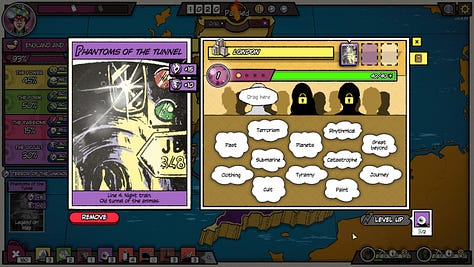


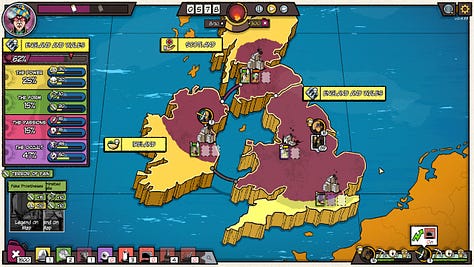
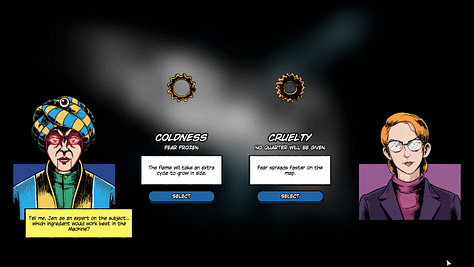

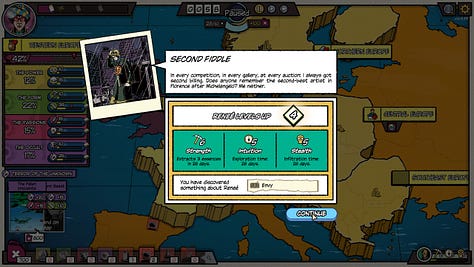
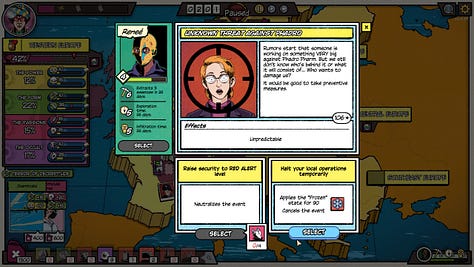
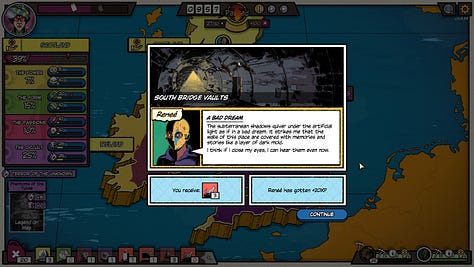
The Fabulous Fear Machine is available on Steam, GOG, and Epic Games Store. More information is available on the official website.



